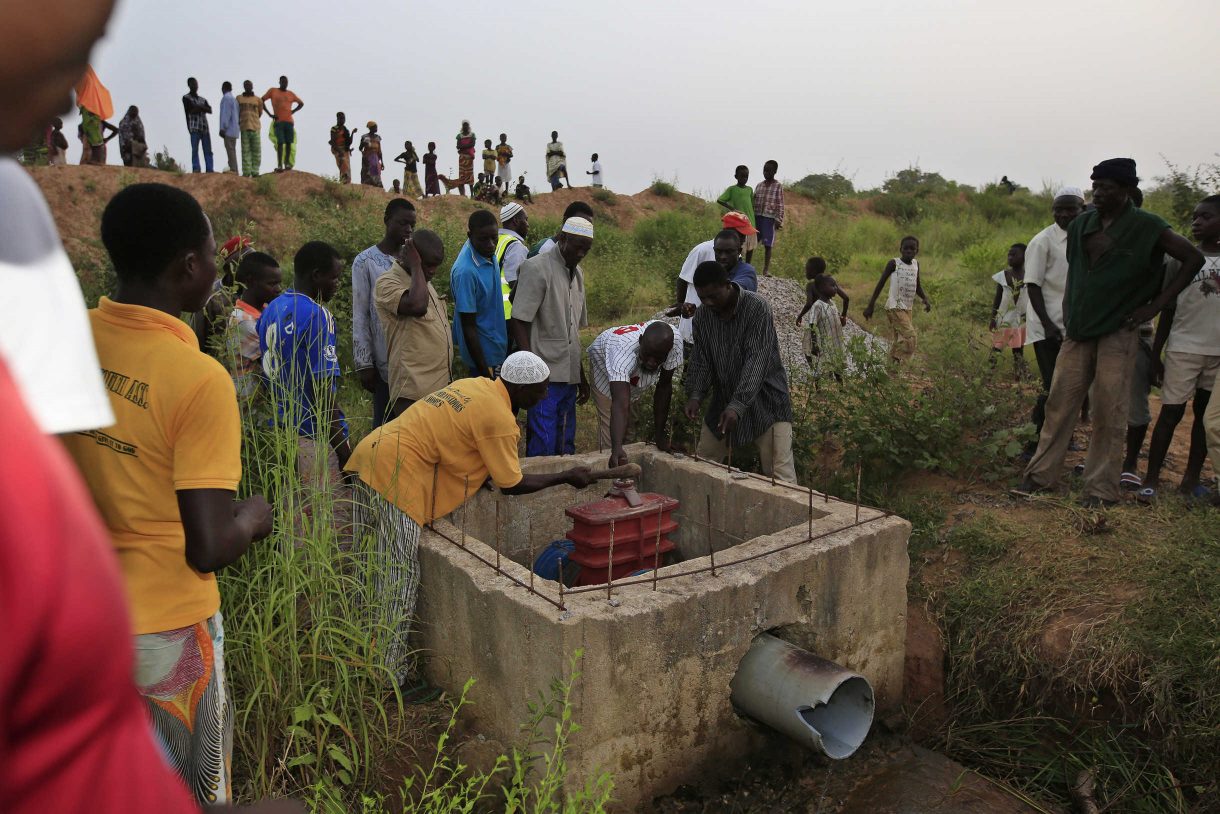Let’s kill corruption, not make it easier to steal money from poor people
 Alhassan Idrissu, head of programs at ACEP, speaks at a village meeting in Zakpalisi, in northern Ghana, where he and his team of researchers were looking at an unfinished irrigation system funded with money from Ghana’s oil industry. Photo by George Osodi/Panos for Oxfam America
Alhassan Idrissu, head of programs at ACEP, speaks at a village meeting in Zakpalisi, in northern Ghana, where he and his team of researchers were looking at an unfinished irrigation system funded with money from Ghana’s oil industry. Photo by George Osodi/Panos for Oxfam America
Key anti-corruption section of US law now threatened again in Congress – you can help save it.
There’s a newly built water reservoir in a small town in northeast Ghana. When you stand on top of the dam embankment with the water behind you, you can see an outflow pipe leading to…nothing. It’s supposed to supply water to an irrigation canal, running into an area where farmers want to grow vegetables during the dry season (and other crops like rice year round). Other, smaller canals will run out of it, eventually serving five villages and hundreds of farmers. It was supposed to be finished more than 18 months ago, but the leaders of this village, called Zakpalisi, say they have not seen the contractor in months. “The project is stalled,” Mohamed Nasam, chairman of the Zakpalisi development council tells a group of researchers visiting the project. “We need help to get it completed.” The researchers, from an organization supported by Oxfam called the African Centre for Energy Policy (ACEP), decided to visit Zakpalisi because the project was paid for with revenue collected from oil production. The total project cost was reported by the Ministry of Finance to be US$ 380,547. A colleague in Ghana pointed out to me that this amount of money is roughly the cost of at least four Toyota Land cruiser 4×4 vehicles, the favorite of politicians in the country. Where could this money be? At the time we were in Zakpalisi, it was not clear if this unfinished irrigation system is a case of corruption or some other problem, but ACEP is getting to the bottom of the matter to find out where the money for the project has gone. Ghana has special sunshine legislation that allows organizations like ACEP to see what oil companies pay the government, and how the government deploys the money in its budget. Oxfam partnered with ACEP to go out and see if the infrastructure projects funded by oil money are actually being built properly and on schedule. ACEP created a web-based video portal called “Oil Money TV” (oilmoneytv.org) to help share information with citizens about how the country is using its petroleum revenues.

Following money: Not easy
I was recently with ACEP staff in Zakpalisi (and one other community with a similar project), because for years now I have been trying to follow oil and mining revenues to see if and how they actually help people in poor countries. And I’m here to tell you, it’s not easy. This is a shame, because there are so many countries rich in oil, gas, and gold, which are still poor. Governments don’t manage the revenue well, and lose the opportunity to use their natural resource wealth to fund schools and hospitals, pay teachers and doctors and nurses, or help small-scale farmers, or improve roads and bridges.
Part of the problem is that citizens just can’t track the money. “We can’t even look at half of the oil-funded projects,” Alhassan Idrissu, ACEP’s head of programs told me. It’s expensive to move around the country and do the research to see what’s actually happening to all that money. “Apart from ACEP, no organization is tracking oil money to the village level,” he told me.
Transparency under threat
Here at Oxfam we’re coming at the problem from both ends: We’re helping groups in countries like Ghana push for laws and policies that will help them track their natural resource revenues, and then get out there and monitor how the money is used. And we’ve also advocated for laws in the US and other countries that require companies to disclose how much they pay governments. Both help groups like ACEP find out what happens to all that dough. In the US, Section 1504 of the 2010 Dodd-Frank Wall Street Reform and Consumer Protection Act requires companies to disclose their payments, but a bill now working its way through the House of Representatives proposes to eliminate this mandate. Its proponents have a number of knowingly false and misguided arguments crafted by oil industry lobbyists for why they want to repeal Section 1504. But at the end of the day, repealing this law will not help US companies create jobs, be more competitive, or generate wealth for shareholders. It will simply create a better environment for secrecy and corruption, make it harder for citizens to follow the money, hold their own government accountable, and fight poverty.

I once met a village chief in the Niger Delta, where Nigeria gets all its oil. His village had been destroyed by conflict and was impoverished. He knew what did this to his community, and was wearing a T-shirt with a simple message: “Kill Corruption.” If you want to help him and millions of others demanding government accountability, and use their natural resource wealth to fight poverty, you can stand up to protect this law: Right now the best way to help kill corruption is to tell your members of Congress to reject the oil lobby’s efforts to repeal Section 1504. Tell your members of Congress: A vote to repeal Section 1504 is a vote for corruption! Call your Representative in the House and your Senator: (202) 224-3121